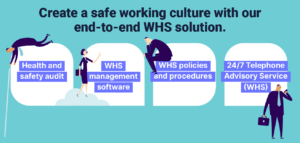By Tiarne Mitchell
In a small business, one person may shoulder many roles and be required to wear many hats, and one of the most important roles is that of a Work Health and Safety (WHS) representative. Without a dedicated WHS team, small businesses need to focus on the safety culture within their organisation to identify and resolve any risks and understand that both physical and psychological risks can be found in any workplace.
Workers compensation insurance is far from a scare tactic or a money-maker; it’s something every business must have under Australian law. This insurance exists to protect businesses if a risk in the workplace develops into a workplace illness or injury. The purpose of this insurance is to cover costs to the business if an employee suffers a loss of wages or incurs medical or rehabilitation expenses due to an accident or illness in the workplace. As a starting point, businesses should go to their relevant state or territory Work Safe (or equivalent) website, which can guide them through how to access this insurance and provide other resources that can assist with risk identification and management.
Employers, including small businesses, need to ensure that they regularly and appropriately assess all risks within the workplace, and implement proper control measures to minimise or eliminate those risks. Risk assessments come in many forms, including via professional bodies, by using Work Safe resources, or by implementing safeguards like risk registers or site hazard assessments to assess the risks within a business.
Small businesses must provide:
- a safe work premises;
- safe machinery and equipment and regular servicing;
- regular assessments of the workplace or office layout;
- updated safe systems or continually review WHS performance; and
- policies and procedures relating to WHS and safe work
Typically, small businesses don’t have the capacity to have a dedicated WHS resource, and therefore it’s more important that you work towards positive workplace practices and a culture of safety as a collective team effort. Promoting positive workplace practices and a culture of safety in the business can assist with risk mitigation because having your employees and team understand the importance of promoting safety, means that there’s a more hands-on-deck approach in identifying and reducing any possible risks that may arise. Developing a culture of safety requires the training and guidance of the team to work together and recognise potential risks. However, there should still be a designated person for risks and incidents to be escalated to, to ensure a central record is kept.
The risks that can be apparent in the workplace include both physical (e.g., trip hazards, risks of electrocution or injury from a machine) and psychological hazards (e.g., poor culture, exposure of staff to customers or clients with trauma, and excessive workloads). This requires your business to assess not only how the workplace environment physically presents, but also the cultural and behavioural factors of the workplace.
The risks for small businesses are no smaller than a large organisation, but such an organisation may have reduced access to a designated WHS team or external professionals to assist with WHS management. As a result, even with limited resources, the obligations on a small business are the same as any other, which means that it’s just as important that they take action to put in the correct steps outlined by their corresponding state or territory.
If this isn’t your area of expertise, and you need some assistance with health and safety, or you don’t have the time, reach out to our team at HR Assured. We can show you how we simplify WHS management in your business using our expert services, including WHS software, 24/7 Telephone Advisory Service, and a WHS audit.
If you’re an HR Assured client and have questions about WHS management, please contact our 24/7 Telephone Advisory Service.
Tiarne Mitchell is a qualified Workplace Relations Consultant at FCB Group (our parent company) and HR Assured. She regularly provides advice to our clients on a wide range of employment issues and management of complex workplace matters.





